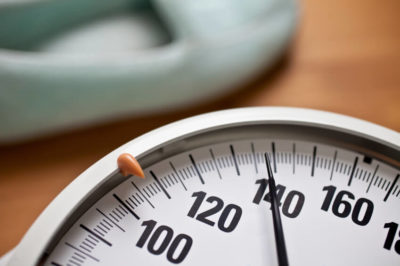Can Poor Gut Health Stop You From Losing Weight?

When we talk about the gut microbiome, we’re really talking about the levels of good and bad bacteria in the gastrointestinal tract. Those billions of bacteria in the gut help to support your immune system, facilitate digestion, provide your body with certain nutrients, and even have an impact on your mood.
The balance of good and bad bacteria in the gut is very sensitive to diet, stress, medications, and other lifestyle factors.
When the bacteria in the gut are out of balance, or in a state of dysbiosis such as Candida overgrowth, you may suffer all kinds of uncomfortable symptoms. These include bloating, gas, pain, indigestion, weakened immunity, fatigue, headaches, and low mood.
In recent years, research has shown that the many species of bacteria in your gut are responsible for much more than just digestion. Studies suggest that gut bacteria may also affect your ability to gain or lose weight. Among other things, your gut bacteria affect:
- How your body stores fat
- How your body balances the levels of glucose in the blood
- How you respond to hormones that make you feel hungry or full
Table Of Contents
How Does Gut Health Affect Weight Loss?
Your Gut Bacteria Are Important, Even From Birth
Scientists have long known that a baby’s gut is first colonized with bacteria when he or she passes through the mother’s birth canal. Bacteria is further developed when the baby is fed breast milk. However, this is not the case in cesarean births or for babies fed on formula.
There is now evidence to suggest that people born by cesarean section are predisposed to obesity and diabetes than those who are born vaginally. Formula-fed babies are also shown to be more susceptible to obesity later in life.
The Fewer Species You Have, The Fatter You Might Be
It appears that gut microbes have an influence on whether you grow up to be obese or slim. Studies comparing lean people with obese people found significant difference in levels of gut bacteria.
Lean people were found to have vast numbers of different species of bacteria, particularly the types that help to break down bulky plant fibers and starches. This provides the body with an extra source of energy. Obese people, however, had fewer species of bacteria, which could suggest that they keep eating in order to boost their energy.
Bad Bacteria Mess with Your Hormones
Certain types of bacteria have been shown to play a part in how hungry or full you are. These bacteria can modulate the levels of ‘hunger-stimulating’ hormones in the body – otherwise known as ghrelin.
Bad bacteria in your gut tend to produce more acetate, which in turns increases the production of insulin. Insulin is a hormone made by the pancreas that promotes the storage of calories. It also promotes the production of ghrelin. Studies in rats have shown that higher levels of acetate results in the rodents eating more and becoming obese. The rats also developed insulin resistance, which is the precursor to diabetes.
Bad Bacteria Makes You Hungrier
In a study involving mice that were fed a high-fat diet, researchers found that those mice who lacked a protein in the gut called TLR5 were prone to excessive weight gain. This was because the levels of ‘bad’ bacteria in their gut were out of balance and causing low-grade inflammation. This led them to eat more and more – in fact, ten percent more than their ‘healthy’ relatives. The mice then developed insulin resistance.
Upon further investigation, researchers found that the metabolism of the mice was damaged, reducing their ability to burn calories.
How Can You Improve Your Gut Health?
- Eat More of the Good
Whole, natural foods provide the nutrients needed for gut bacteria to proliferate. Foods rich in probiotics and fiber such as fresh fruits and vegetables are best for feeding the ‘good’ bacteria. - Eat Less of the Bad
Foods that destroy beneficial bacteria and encourage the growth of ‘bad’ bacteria include those that are high in sugar and artificial ingredients. Foods to eliminate should include processed foods, junk foods, fizzy drinks, alcohol and other not-so-good treats. - Supplement with Probiotics
Probiotics are a convenient way to deliver high numbers of beneficial bacteria to the gut, which can help to improve digestion and overall wellbeing. Probiotics can be sourced from health supplements or by eating fermented foods such as kefir, yogurt or kimchi. - Get Some Exercise
Regular exercise has a positive effect on your gut bacteria by enhancing the number of beneficial species, improving diversity and the boosting the development of new bacteria. And of course, exercise helps to burn excess calories, which in turn supports weight loss!
Better Bacteria Means Better Weight Loss!
Supporting your gut with a good diet and probiotics can not only fast-track your weight loss, but improve your overall health and wellbeing. Get your bacteria in balance and you’ll enjoy better digestion and a faster metabolism!
For more tips on improving your gut health and digestion, boosting your immune system, and switching to a healthy diet, check out our Ultimate Candida diet program.

3-Month Candida Elimination Kit Start Your 3-month Candida Cleanse
This Candida Kit contains all the supplements recommended on the Candida Diet:
- LIVER ONE to process and remove the toxins created by Candida.
- CANDASSIST to inhibit and weaken the Candida colonies in your gut.
- PROBIOTIC to replace the Candida yeast with probiotic bacteria.
Plus... the CANDIDA DIET RECIPE BOOK with 50+ low-sugar recipes


Leave a Reply